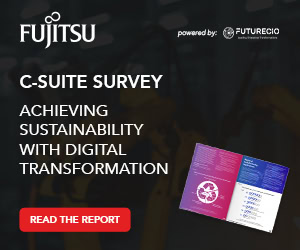In 2017, Olam Group redefined its purpose to ‘Re-imagining global agriculture and food systems’. Charged with leading and executing this vision was Suresh Sundararajan, then chief officer.
This disruption meant making a material impact in food and agriculture by introducing game-changing experiences and creating new business models and profit pools – reconfiguring the organisations’ core to deliver cost efficiencies and higher productivity. A key strategy was to approach this from both ends of the value chain.
From this re-imagining were born two organisations.
Olam Ventures is an independent incubator for start-up growth initiatives focusing on digital and sustainability. Currently, this includes JIVA, Adva, Terrascope and Re- Foods.
Olam Technology Business Services offers digital and technology services to an extensive portfolio of clients in the Food and Ag space. Its expertise spans core areas of Technology services, cybersecurity, digital and global business services covering the entire spectrum of operations from farm to fork.
FutureCIO spoke to Sundararajan, winner of the CDO of the Year award in the IDC Future Enterprise Awards (FEA) 2022 Singapore. He is the CEO of Olam Ventures and CEO of Olam Technology Business Services, both under the Olam Group umbrella.

What lessons or experiences have helped you become the better leader that you think you are today?
Suresh Sundararajan: I think, at that core, the ability to handle ambiguity, and the ability to look at things in an experimental framework has allowed me to expand the scope of my vision of what could be done, and what are the possibilities.
"In setting up a new function, you need to have the ability to handle and embrace ambiguity. What has shaped my level of conviction is that you could enter something completely unknown, but you have a broad directional thesis and are very clear that if you give your best shot, you will know very soon whether it's working or not. And from there, you can decide whether you can go forward, or you can kill."
Suresh Sundararajan
This is the ability that has helped shaped me as a leader today. Otherwise, we would not have really tried experimentation on digital, even on Olam Ventures.
I try to push my people towards unconstrained thinking. To think big and let's see where it takes us.
You started as a controller and more recently you initiated the company’s transformation. What inspired you to do what you did?
Suresh Sundararajan: Very early on I recognised a personal trait of mine – an unlimited curiosity to learn. I studied in public schools in India, where the teaching is very basic, and you don't really imbibe the essence of what is being taught. For instance, in math, you are told to use a formula, but you never understand the formula.
I realised that if I do well academically, I could get the job. But I soon discovered that I also needed the knowledge to succeed. I’ve extended this curiosity into the workplace.
Even in finance, I can honestly say I am not a bean counter. Where I am good at is strategic finance. If you ask me how to create value, and how to break the return on equity for a company, I can break it down into the drivers.
This curiosity has fostered my preference for experimentation, innovation, and a new type of thinking.
In your experience, how important is technology in this transformation that you initiate or provided guidance for?
Suresh Sundararajan: I think technology in the last several decades has become at the centre of any transformation.
As individuals, we are very comfortable using technologies like apps, smartphones, and tablets, but as employees of a company, we struggle with digital transformation. We continue to use archaic tools, mainframes, etc. When somebody talks about something new, we don't buy into it.
"Successful companies have shown that technology can sit at the centre and transform business. It can do two things. It can remove all inefficiencies and create massive value in the current business, or it can show them with technology, you completely can go into a different business that you're not even imagining."
Suresh Sundararajan
Why do some companies fail in transformation?
Suresh Sundararajan: In my opinion, a lot of companies make the mistake of getting fascinated by modern technology and force-fitting that to the problem that they're trying to solve. This doesn’t work.
"I call this inventing the problem, not inventing the solution. I always tell people to first ignore technology. Put it on the back burner. Let us discuss first through brainstorming what is the problem we are trying to solve. And then see what technology we have."
Suresh Sundararajan
You'll be surprised that sometimes basic technology, which has been there for 50 years is good enough. When we work in the field with farmers, we use basic technologies because that's what is required.
We don't need to be influenced by current technologies. The choice is about identifying the problem or the friction that you're trying to solve, marrying the technology later becomes much easier.
How do you see yourself and other leaders guiding and enabling the fulfilment of an organisation's ESG and sustainability aspirations?
Suresh Sundararajan: I think when it comes to ESG, technology can be a huge enabler. The individual components of ESG – environment, social and governance – have their own complexities, and they have their own groups of stakeholders that you must address.
With technologies, you now find new avenues to solve problems and scale them. The cost of rolling ESG initiatives can be significantly brought down with the help of technology.
But there's still a problem that we are not solving very closely – sustainability. I think there is a big confusion there, different people have different definitions of sustainability.
We need to bring a good understanding and a dictionary of what ESG means.
There is widespread acceptance that we have a talent shortage today. As a leader, how are you approaching efforts to achieve team cohesion and inclusion, and solve the talent shortage/gap?
Suresh Sundararajan: I think the starting point is to have a strong purpose that can be used to attract employees. What is the purpose of joining this organisation, and working for this? Does it align with my purpose? If not maybe I should do something else.
Look for employees who are in some way married to your corporate purpose. Somebody put it as big P and small. P Big P, corporate purpose, small. P is your purpose. Purpose is very important for us to get the right people.
The second thing is how you make sure that you can enable them to think in an unconstrained manner that gives them an opportunity to create an impact. Governance is there to make sure that you do not tolerate things like toxic behaviour and rewarding poor performers.
What would be your advice to future leaders?
Suresh Sundararajan: Most companies don't foster innovation. People are encouraged to only do what they are trained to do. For me, it is about investing in people and making them think in an unconstrained fashion.
I wrote an article published in Forbes titled Nurturing an Innovation Mindset where I posit that innovation gets stifled at the very onset when employees believe that an idea has no chance of being approved by the boss.
I don't know how many such ideas are getting killed at organisations. Promote unconstrained thinking. Tell your employees that you know it is somebody else’s job to apply the constraint, not yours.
If you think in an unconstrained way, innovation will flourish.




